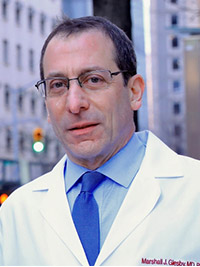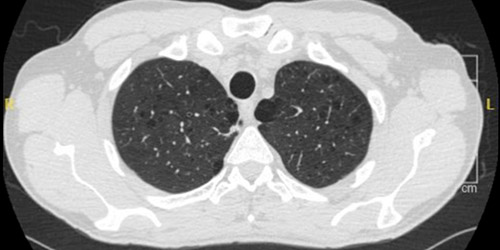Robert J. Kaner, MD, a pulmonologist in the Division of Pulmonary and Critical Care Medicine at NewYork-Presbyterian/

Dr. Robert Kaner

Dr. Marshall Glesby
The study – Doxycycline for Emphysema in People Living with HIV (DEPTH) – builds on earlier translational research that Dr. Kaner began conducting more than a decade ago. “We started out with a very simple research question: Why do HIV-positive individuals who smoke seem to develop emphysema at an earlier age than HIV-negative individuals who smoke?” says Dr. Kaner.
Studies estimate that 11 percent of people living with HIV worldwide – some 4 million – have chronic obstructive pulmonary disease (COPD). After adjusting for tobacco use, the risk of COPD remains two- to three-fold higher in people with HIV compared to those without HIV.
“We began with a small amount of data doing research bronchoscopies on several individuals who were HIV positive with early emphysema,” says Dr. Kaner, who examined the gene expression of the alveolar macrophages, a type of white blood cells in the lungs that are the first line of defense against pathogens. “When we looked at the pattern of gene expression in those cells, we noticed that a type of enzyme called the matrix metalloproteinases [MMP], of which there are many family members, had increased expression.”
With NIH funding for a program project grant, Dr. Kaner went on to examine additional bronchoscopy samples focusing on the gene expression of alveolar macrophages and measuring the proteins in bronchoalveolar lavage fluid. He and his team discovered that within the matrix metalloproteinases, the enzymes MMP-2, -7, -9, and -12 were up-regulated in terms of gene expression in alveolar macrophages.
“We found activated forms of the enzymes in the bronchoalveolar lavage fluid, which is unusual because these enzymes are secreted in an inert form and then have to be activated before they actually have enzymatic activity,” says Dr. Kaner. “Interestingly, the active forms of MMP-2, -9, and -12 were exclusively detected in epithelial lining fluid from HIV-positive individuals with early emphysema. Since the activities of the up-regulated alveolar macrophages MMPs include collagenases, gelatinases, matrilysins, and elastase, these data suggested that up-regulated alveolar macrophages MMP genes and activation of MMP proteins may contribute to the emphysema of HIV-positive individuals who smoke.” The results of this study were published in the Journal of Leukocyte Biology in 2009.
Armed with these findings, Dr. Kaner and Dr. Glesby embarked on an NIH double-blinded pilot study to test the safety and tolerability of the antibiotic doxycycline in people with well-controlled HIV and emphysema and/or airflow obstruction. The drug was already an FDA-approved MMP inhibitor for periodontal disease. “When we applied for our pilot study, it was in response to an NIH request for applications from the National Heart, Lung and Blood Institute, which was interested in funding studies that were specifically directed towards lung disease in people living with HIV,” says Dr. Kaner. “A requirement of this funding mechanism was for a pulmonologist and infectious disease doctor to collaborate as dual principal investigators. That was how we started working together on this project and we’ve been working together as dual principal investigators ever since.”
In their pilot study, all 27 patients were recruited at NewYork-Presbyterian/

CT scan of emphysema in a person living with HIV
From those results, Drs. Kaner and Glesby went on to design the now recruiting DEPTH study, an NIH-funded phase 2 multicenter investigation of individuals with well controlled HIV randomized to 100 mg of doxycycline or placebo twice a day over 72 weeks. The Weill Cornell Medicine researchers seek to enroll 250 participants at over a dozen sites across the country.
“Doxycycline has been around for decades and also has been widely used in people with HIV to treat other infections in that population, just as it’s used in the general population,” says Dr. Glesby. “The short-term safety profile of doxycycline has been favorable, and it has been studied for longer term use in other disease states. So, there is a track record of safety, even with longer-term administration.”
“This study is still proof-of-concept that by inhibiting these enzymes we can slow the progression of emphysema in people with HIV,” continues Dr. Glesby. “There have been other drugs in development targeting these enzymes, none of which are available or FDA approved. But if we are able to demonstrate that this mechanism has an impact on the natural course of emphysema, then it’s possible that there could be other drugs in the future that don’t have the antimicrobial activity that doxycycline has but retain activity in terms of inhibiting these enzymes.”
“This is the first study that specifically targets lung disease in HIV-positive individuals and also targets a specific biologic mechanism where we hope to alter the natural history of this disease.” — Dr. Robert Kaner
According to Dr. Glesby, the primary endpoint of the study is the change in diffusing capacity of the lung over time. “We also have some important secondary endpoints that we should have adequate statistical power to investigate,” he adds.
“We wanted to pursue this study in the HIV-positive population, which was the basis of our preliminary pilot study data,” says Dr. Kaner. “But we’re hoping that it might actually be a more generalizable mechanism that would apply to individuals who don’t have HIV. First, however, we have to determine that the proof-of-concept really works before we expand it to HIV-negative individuals.”
Dr. Kaner notes that the DEPTH trial is unique in several ways. “This is the first study that specifically targets lung disease in HIV-positive individuals and also targets a specific biologic mechanism where we hope to alter the natural history of this disease. So far there haven’t been any significant breakthroughs in slowing emphysema progression, including in HIV-negative people. Because of the multicenter nature of this study, we would encourage other physicians to advise their patients about our study and possibly refer them for screening.”
Dr. Glesby agrees, adding, “COPD and emphysema in people with HIV have been somewhat neglected in recent years with a greater focus on heart disease and aging-related complications. I think it is important that lung disease be on the radar of physicians caring for individuals with HIV as the data suggests that even after adjusting for smoking as a factor, which we know is more common in people with HIV, their risk of smoking-related lung disease remains elevated. Additionally, for people who have emphysema and HIV, the rates of progression appear to be accelerated. This is a clinically important issue in a subset of people with HIV and we hope that our trial will shed additional light on treatment.”



